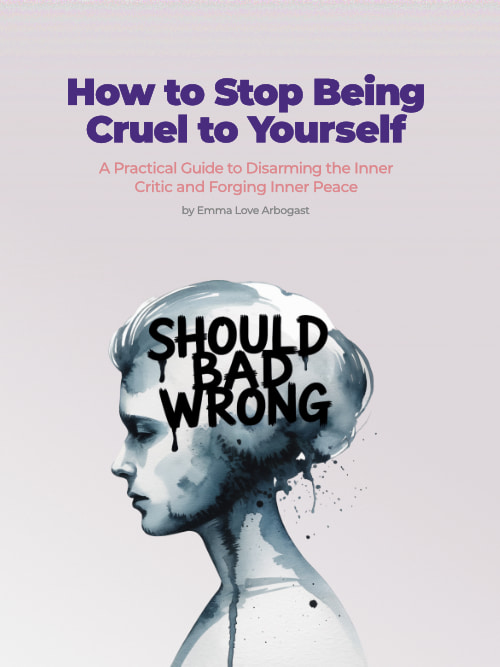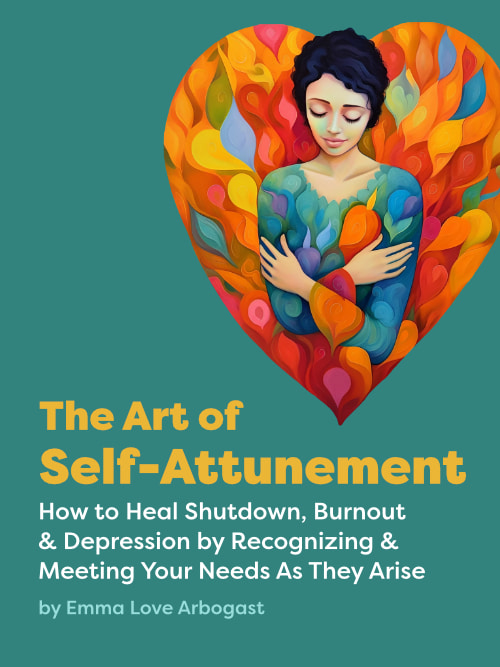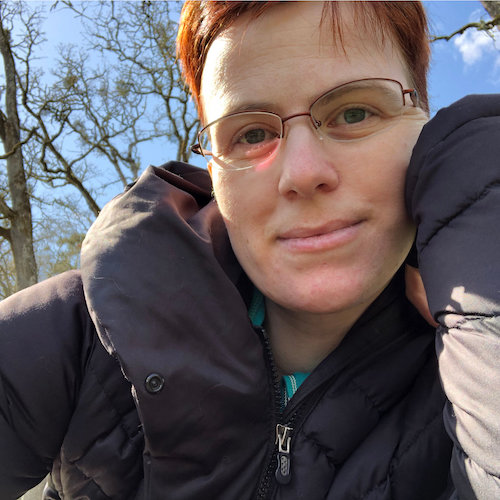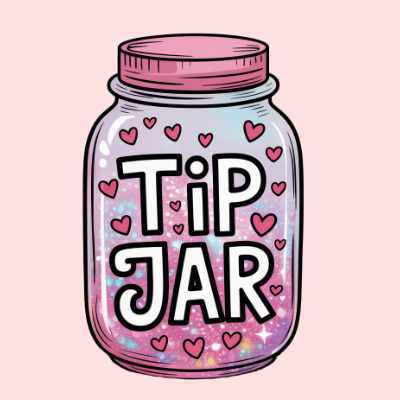It Doesn’t Have to Mean That You’re Broken
This post is about the meaning we give to the events in our lives, how destructive that meaning can be, and the freedom we gain when we take back the power to assign meaning from the wounded child in our minds.
First, I want to show how arbitrary meaning can be.
One day recently, I wondered aloud if my bathroom was too “girly” for my husband, because it’s decked out in pink.
He shrugged and said, “I didn’t know it was pink”.
He’s colorblind.
Oh right. I had forgotten that “pink” is a theoretical concept to him. So the only meaning it has is second-hand. I can tell him it’s “girly”, and he can remember I said that, but it will never feel “girly” to him, because he has no way to form a perceptual association between “girly” and a color he can’t even see.
There’s more. I used to have a story in my head that being “girly” is bad, weak, and stupid. I decided that that story was stupid, and I like “girly” things.
The bathroom exists in objective reality, but subjectively, it’s a very different place to each of us. To me, it’s an affirmation that I can choose the life I want.
To my husband, it’s a real, private bathroom instead of a toilet in a prison cell. It’s proof he is no longer in prison. He has no idea what color it is, and doesn’t care.
What is the objective reality of our bathroom? Is it objectively “pink”?
Well, it’s objectively a certain color, but every association I have with the word “pink” is invented and assigned to it. For example, he doesn’t really know the difference between dusty rose or barbie-doll hot pink or rose gold or pastel pink. These all have different meanings to me. There’s a whole universe meanings associated with “pink” in my mind that doesn’t exist for him.
I’m not denying objective reality exists. You are a physical creature with physical needs. That’s not going to change, no matter how you feel about it. If I have to pee, it doesn’t really matter how I feel about the color of the bathroom.
But when we do assign meaning to reality, which is all the time, we can end up trapped in that meaning, and that meaning can do real damage to our psyches, and limit what we believe is possible for ourselves.
Meaning can feel more objective than it actually is.
Meaning feels objective when we have strong emotional associations with it. If my above meaning that “girly is stupid” has a bunch of shame hooked up to it, it’s going to feel real. And the shame is real, in that it’s a real chemical cascade going on in my body. But the meaning itself isn’t, which means I can change it. I can unhook those associations, and free myself from that shame.
Meaning can also feel objective when it is absorbed from our culture. It feels like it’s coming from “out there”, just like perception. But perception and interpretation are two different things. Perception is the photos hitting your eyes. “Pink is girly” has nothing to do with perception. It’s not a fact. “My culture assigns the meaning of “girly” to the color pink” is a fact. It’s also a fact that pink means a lot of different things in different cultures and at different times. Pink has no inherent meaning.
Developing flexibility and choice in your relationship with meaning is profoundly freeing.
Snails are deaf. They don’t have ears or ear canals. So, sound doesn’t exist to them, except on a basic level as vibration. Imagine what sensory organs we don’t have. We can’t make meaning out of the ultraviolet colors on some flowers, because we can’t see them. But bees can. We have no organ to sense the Earth’s magnetic field. But some birds do.
We live in a world that we have painted meaning onto. We have decided that cereal is a breakfast food (depending on where you live). It’s actually just some mushy grain with sugar added to it. You can eat it whenever you want.
Confronting the inherent meaninglessness of existence can lead some people to a sense of existential anxiety, so they avoid it. It feels safe and familiar to continue living with the meanings that you grew up with.
But sometimes those meanings are toxic. You need to change them.
We end up holding ourselves hostage to the meaning we give things.
And nowhere is that more true than with relational trauma. One of the hardest parts of recovering from childhood wounds, especially attachment wounds, is separating what happened to you from what you made it mean.
If our parents didn’t meet our needs as infants, we decide we are bad and wrong. If our parents hurt us or violated our boundaries, we decide somehow their actions mean something about who we are.
We were overwhelmed with the pain we were feeling, and we organized that pain into a story. That story made sense of what was happening and made us feel more in control, and safer.
Then we grew up and projected that story onto other situations. If something bad happens to us, or someone just doesn’t know what we need, or accidentally hurts us, or we encounter someone who is ignorant or unskillful or mentally ill, we apply that same story to our pain. There’s something wrong with me. I don’t deserve to have my needs met. The world is against me.
It can feel like we are getting feedback from the world about ourselves, when we are actually seeing the world through a set of meanings we invented (unconsciously) when we were two years old.
It feels real though, because of our emotional response. We created a story to explain that original pain, and then we kept the story alive, which keeps the pain alive too. We turn what happened to us into a torture instrument that we now use on ourselves.
Our brain does this because it’s trying to be helpful. It’s not your fault, and you couldn’t have stopped it from happening, but you can change it.
The stories that babies in pain make up about their world follow very predictable patterns:
- This happened to me because I’m flawed.
- It’s my fault.
- I’m bad.
- There’s something wrong with me.
- I’m broken.
- I’m not enough.
- I deserve bad things.
- Good things never happen to me.
- I’m just the kind of person this kind of thing happens to.
- This will never change.
Every single one of these stories is wrong. You invented it. It isn’t real. It wasn’t real then, and it isn’t real now.
We invent these stories and then we rehearse them in our mind so many times that they become real to us. We perceive every situation through our story, and it just gets reinforced. But they are not real.
Go look at a baby. Just find a picture and stare at it. Is there anything wrong with that baby? Is there any reason on Earth that that little creature could deserve something bad to happen to it? Of course not, that’s insane. That baby deserved to have its needs met, and so do you.
Are there any children you have ever met who you think deserve bad things to happen to them? Of course not.
But how many people have you met that you have thought, geesh, I hope they don’t have kids?
Bad things happen to kids because not all parents are great parents. That’s all. It has nothing to do with you. You personalized something that wasn’t personal.
Our imaginations are wonderful, until they turn against us.
If you had shitty parents, that doesn’t mean anything about you. It just literally doesn’t. All it means is that you had shitty parents. It couldn’t possibly mean anything about you. Your parents were shitty at being parents before you were born. They didn’t have the ability to care for a baby properly. It had nothing to do with you.
They made their choices in life, you get to make your own.
If your parents were well-meaning-but-inadequate, or too wrapped up in themselves to truly notice you and love you the way you needed, or just unskilled and unprepared to be parents, that has nothing to do with who you are.
But knowing that, and changing the story, are two different things. The story is wired in at an emotional level, so you need to do emotional work, and sometimes trauma work, to change it.
As a card-carrying member of the “had shitty parents” club, I’m not saying it’s as easy as telling yourself it’s not true.
But there are a ton of different methods out there to use to change these stories. I describe some up in the menu at the top of the page under “Tools”. (I’m working hard on attachment stuff right now, and, oof, it’s a lot).
All I’m saying is, do the work. Figure out what stories you made up, and change them.
Because stories like that kill you. They kill your spirit, they kill your drive, they kill your dreams, they kill your ambition, and they kill your body too, slowly.
You don’t have to do that to yourself. You just don’t. You have a choice. You can change the story.
Here are some stories that I wish for you:
- You are amazing.
- You are brilliant.
- You are an asset to the planet.
- There is nothing wrong with you, and there never was.
- Your dreams are precious and you deserve them.
- The world is awash with possibilities for you.
- You can heal your pain.
- You can change your stories.
- You can create the life you want, starting now.
Self-love is a set of skills you can learn

Stop Being Cruel to Yourself
$2.99


Hey there! If you're new here, welcome to the Emmaverse! 🌈✨
About me: I'm autistic/ADHD and I write about how to be free and happy from the inside out.
Keep in touch?
Self-Liberation Society


I love this post. You explain the meaning we assign to things and give reasons as to why we do that so well. It can be so hard to unlearn these stories, but so necessary at the same time. (I’m still trying to convince baby me that we’re *good* after several months of healing.)
On a related note, I’m a recovering FA too and I just want to thank you for sharing these things because I know it can be so scary to be vulnerable. I found PDS thanks to your blog post about FA and it’s giving me hope that I can get better.